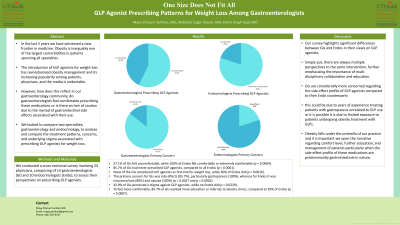Sunday Poster Session
Category: Obesity
P1453 - One Size Does Not Fit All: GLP Agonists Use for Weight Loss Among Gastroenterologists
Sunday, October 27, 2024
3:30 PM - 7:00 PM ET
Location: Exhibit Hall E

Has Audio

Maya C. Sarihan, MD
University of Texas at Houston
Houston, TX
Presenting Author(s)
Abdullah S. Aleem, MD1, Maya C. Sarihan, MD1, Parvir Aujla, MD2
1University of Texas at Houston, Houston, TX; 2University of Texas Health, McGovern Medical School, Houston, TX
Introduction: The introduction of GLP agonists for weight loss has revolutionized obesity management and its increasing popularity among patients, physicians, and the media is undeniable. However how does this reflect in our gastroenterology community, do gastroenterologists feel comfortable prescribing these medications or is there an heir of caution due to the myriad of gastrointestinal side effects associated with their use. We compared two specialties; gastroenterology (GI) and endocrinology (Endo), to analyze the treatment patterns, concerns, and underlying stigma associated with prescribing GLP agonists for weight loss.
Methods: We conducted a cross-sectional study involving 24 physicians, comprising of 14 gastroenterologists and 10 endocrinologists, to assess their perspectives on prescribing GLP agonists. The fisher's exact test was used for data analysis.
Results: Regarding comfort prescribing GLP agonists, 57.1% of GIs felt uncomfortable, while 100% of Endos felt comfortable or extremely comfortable (p = 0.0064). 85.7% of GIs had never prescribed GLP agonists, in comparison 100% of Endos had prescribed them (p < 0.0001). None of the GIs considered GLP agonists as first-line for weight loss, while 60% of Endos did (p = 0.0016). The primary concern for GIs was side effects (85.7%), particularly gastroparesis (100%), whereas for Endos it was insurance/cost (80%) (p = 0.0027). 42.9% of GIs perceived stigma amongst their peers associated with GLP agonists, while no Endos did (p = 0.0239). To feel more comfortable, 85.7% of GIs wanted more education or a referral option to obesity clinic, compared to 20% of Endos (p = 0.0007).
Discussion: Our survey highlights significant differences between GIs and Endos in their views on GLP agonists. Our data shows there is a stigma amongst GIs regarding GLP use for weight loss which may be contributing to our low prescribing rates. Stigmas impact our ability to treat and manage our patients to the best of our abilities. Further highlighting the importance of multi-disciplinary collaboration and education for obesity management, something an overwhelming majority of GIs in our survey indicated would increase their comfort level. Obesity falls under the umbrella of GIs practice and it is imperative we open the narrative regarding comfort level, further education, and management of obesity, particularly when the side effect profile of these medications are predominantly gastrointestinal in nature.
Note: The table for this abstract can be viewed in the ePoster Gallery section of the ACG 2024 ePoster Site or in The American Journal of Gastroenterology's abstract supplement issue, both of which will be available starting October 27, 2024.
Disclosures:
Abdullah S. Aleem, MD1, Maya C. Sarihan, MD1, Parvir Aujla, MD2. P1453 - One Size Does Not Fit All: GLP Agonists Use for Weight Loss Among Gastroenterologists, ACG 2024 Annual Scientific Meeting Abstracts. Philadelphia, PA: American College of Gastroenterology.
1University of Texas at Houston, Houston, TX; 2University of Texas Health, McGovern Medical School, Houston, TX
Introduction: The introduction of GLP agonists for weight loss has revolutionized obesity management and its increasing popularity among patients, physicians, and the media is undeniable. However how does this reflect in our gastroenterology community, do gastroenterologists feel comfortable prescribing these medications or is there an heir of caution due to the myriad of gastrointestinal side effects associated with their use. We compared two specialties; gastroenterology (GI) and endocrinology (Endo), to analyze the treatment patterns, concerns, and underlying stigma associated with prescribing GLP agonists for weight loss.
Methods: We conducted a cross-sectional study involving 24 physicians, comprising of 14 gastroenterologists and 10 endocrinologists, to assess their perspectives on prescribing GLP agonists. The fisher's exact test was used for data analysis.
Results: Regarding comfort prescribing GLP agonists, 57.1% of GIs felt uncomfortable, while 100% of Endos felt comfortable or extremely comfortable (p = 0.0064). 85.7% of GIs had never prescribed GLP agonists, in comparison 100% of Endos had prescribed them (p < 0.0001). None of the GIs considered GLP agonists as first-line for weight loss, while 60% of Endos did (p = 0.0016). The primary concern for GIs was side effects (85.7%), particularly gastroparesis (100%), whereas for Endos it was insurance/cost (80%) (p = 0.0027). 42.9% of GIs perceived stigma amongst their peers associated with GLP agonists, while no Endos did (p = 0.0239). To feel more comfortable, 85.7% of GIs wanted more education or a referral option to obesity clinic, compared to 20% of Endos (p = 0.0007).
Discussion: Our survey highlights significant differences between GIs and Endos in their views on GLP agonists. Our data shows there is a stigma amongst GIs regarding GLP use for weight loss which may be contributing to our low prescribing rates. Stigmas impact our ability to treat and manage our patients to the best of our abilities. Further highlighting the importance of multi-disciplinary collaboration and education for obesity management, something an overwhelming majority of GIs in our survey indicated would increase their comfort level. Obesity falls under the umbrella of GIs practice and it is imperative we open the narrative regarding comfort level, further education, and management of obesity, particularly when the side effect profile of these medications are predominantly gastrointestinal in nature.
Note: The table for this abstract can be viewed in the ePoster Gallery section of the ACG 2024 ePoster Site or in The American Journal of Gastroenterology's abstract supplement issue, both of which will be available starting October 27, 2024.
Disclosures:
Abdullah Aleem indicated no relevant financial relationships.
Maya Sarihan indicated no relevant financial relationships.
Parvir Aujla indicated no relevant financial relationships.
Abdullah S. Aleem, MD1, Maya C. Sarihan, MD1, Parvir Aujla, MD2. P1453 - One Size Does Not Fit All: GLP Agonists Use for Weight Loss Among Gastroenterologists, ACG 2024 Annual Scientific Meeting Abstracts. Philadelphia, PA: American College of Gastroenterology.

